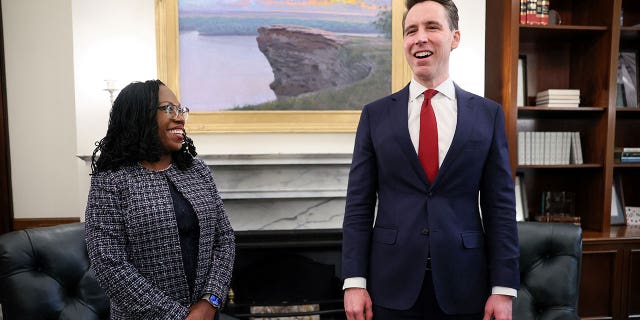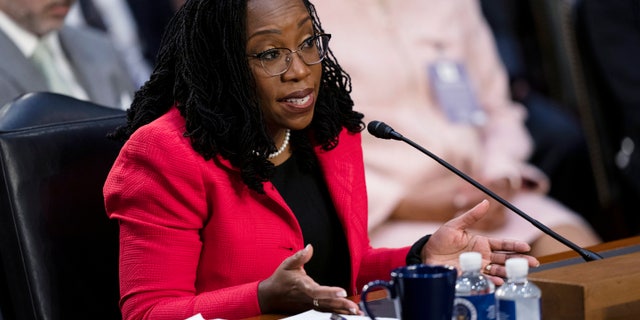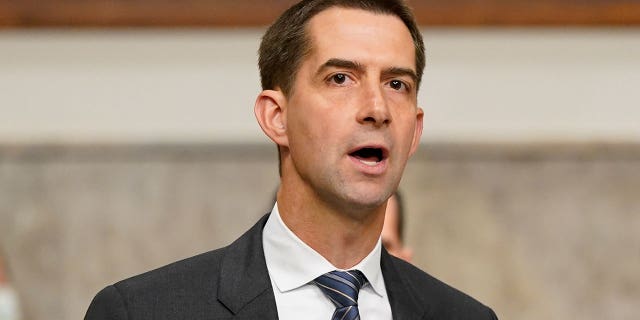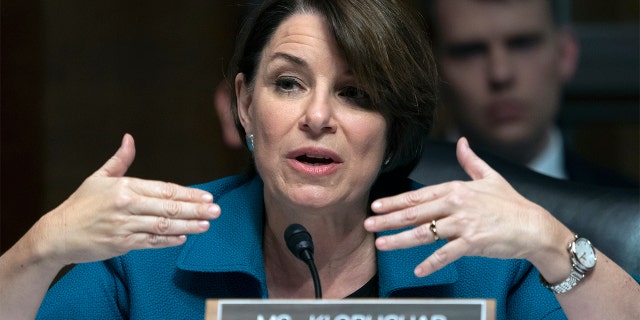NEWYou can now listen to Fox News articles!
Sparks flew in Supreme Court nominee Judge Ketanji Brown Jackson’s confirmation hearing Tuesday as Republican senators clashed with Jackson on her sentencing record for child pornography offenders.
Senators also brought up hot-button issues from critical race theory to the emergency powers the Supreme Court used to block President Biden’s COVID-19 vaccine mandate and questioned whether she was too lenient on a “drug kingpin.” But by far the most contentious exchange came when Sen. Josh Hawley, R-Mo., pressed Jackson over a particular grisly porn case.
Hawley noted that Jackson sentenced an 18–year-old to just three months in prison for possession of lengthy videos and images of pre-pubescent children performing sexual acts. The prosecutors in the case asked for two years.
Supreme Court nominee Ketanji Brown Jackson testifies during her Senate Judiciary Committee confirmation hearing on Capitol Hill in Washington, Tuesday, March 22, 2022. (AP Photo/Andrew Harnik)
(AP Photo/Andrew Harnik)
While she was sentencing the individual, Hawley said, Jackson apologized to him and his family for the pain the sentence would cause.
“Is he the victim here or are the victims the victims?” Hawley later added.
Jackson also said, according to Hawley, that the man’s porn collection “was not actually as large as it seems” and that he was “fascinated by sexual images involving what were essentially your peers.”
“Judge, he was 18, these kids are eight. I don’t see in what sense they’re peers,” Hawley said.
Jackson defended her decision on that sentence.

U.S. Senator Josh Hawley (R-MO) meets U.S. Supreme Court nominee and federal appeals court Judge Ketanji Brown Jackson, in his office at the United States Capitol building in Washington, U.S., March 9, 2022. REUTERS/Evelyn Hockstein
(REUTERS/Evelyn Hockstein)
LIVE UPDATES: BIDEN’S SUPREME COURT PICK KETANJI BROWN JACKSON TESTIFIES FOR SECOND DAY
“Unlike the many other child pornography offenders that I had seen as a judge … this particular defendant had just graduated from high school,” she said. “Some of the materials that he was looking at were older teenagers.”
“Sentencing is a discretionary act of a judge. But it’s not a numbers game,” she continued. “Congress has given judges not only the discretion to make the decision but required judges to do so on an individualized basis.”
Hawley said the 18-year-old had “an extremely large collection of pre-pubescent pornography” of children ages 8, 10, 11 years old.
“I am questioning your discretion, your judgment, that’s exactly what I’m doing,” Hawley said. “I’m not questioning you as a person. I’m not questioning your excellence as a judge, frankly. You said it. You had discretion and that’s exactly what I’m doing. I’m questioning how you used your discretion in these cases.”

Sen. Ted Cruz, R-Texas, speaks at the Conservative Political Action Conference (CPAC) Thursday, Feb. 24, 2022, in Orlando, Fla. (AP Photo/John Raoux)
(AP)
KETANJI BROWN JACKSON CONFIRMATION HEARINGS: BIDEN NOMINEE QUIZZED ON IMMIGRATION RULING
“I believe you care for children,” Sen. Ted Cruz, R-Texas, also told Jackson. “But I also see a record of activism and advocacy as it concerns sexual predators that stems back decades. And that is concerning.”
Cruz was referencing not just the child pornography cases Hawley talked about but also a note Jackson wrote in law school that called into question whether some types of laws for sexual offenders are constitutional.
Jackson said Cruz – who was her law school classmate – was misconstruing the purpose of the kind of note she wrote, which was published in the Harvard Law Review.
“The point that I was making was not that the laws were bad, that the laws were wrong. I was trying to assess something that is sort of fundamental in terms of the characterization of the laws,” Jackson said.

Supreme Court nominee Ketanji Brown Jackson speaks during her confirmation hearing before the Senate Judiciary Committee, Tuesday, March 22, 2022, in Washington.
(AP Photo/Evan Vucci)
“What I was trying to do is figure out how to make the determination whether they were punitive or preventative,” she said. “My note wasn’t advocating for the striking down of those laws.”
Cruz further pressed Jackson about the alleged use of critical race theory in an elementary school Jackson is a board member of.
BIDEN SUPREME COURT PICK JACKSON RECOGNIZES HISTORY OF HER SELECTION, PROMISES TO BE ‘INDEPENDENT’
“When you just testified a minute ago that you didn’t know of critical race theory… in K through 12, I will confess, I find that statement a little hard to reconcile with the public record,” Cruz said. “Because if you look at the Georgetown Day School’s curriculum, it is filled and overflowing with critical race theory… among… the books that are either assigned or recommended.”
Cruz highlighted one book taught to young elementary schoolers which he said argued babies “are taught to be racist or anti-racist. There is no neutrality. Another portion of the book, they recommend to babies confess when being racist.”
“Do you agree with this book that is being taught with kids that the babies are racist?” Cruz asked Jackson.
“I do not believe that any child should be made to feel as though they are racist or though they are not valued, or though they are… victims, that they are oppressors,” Jackson said. “I don’t believe in any of that.”

WASHINGTON, DC – SEPTEMBER 28: Sen. Tom Cotton (R-AK) speaks during a Senate Armed Services Committee hearing on the conclusion of military operations in Afghanistan and plans for future counterterrorism operations on Capitol Hill.
(Patrick Semansky)
In another tough round of questioning, Sen. Tom Cotton, R-Ark., pressed Jackson on rising crime and the need to increase police — which Jackson declined to answer.
Then he pressed her on a specific fentanyl dealer whose sentence Jackson reduced in a way Cotton said amounted to blatant judicial activism. Jackson, Cotton said, took it upon herself to effectively turn that man’s motion for compassionate release to a motion for a reduced sentence, applying a law that wasn’t retroactive as if it were.
“You chose to rewrite the law because you were sympathetic to a fentanyl drug kingpin whom you had expressed frustration at having sentenced him to his 20-year sentence in the first place. You twisted the law and you rewrote it.”
Jackson said she disagreed with Cotton’s reading of the situation. She said the law the man relied on also allowed reduced sentences, not just compassionate release. “Congress provided judges through the compassionate release motion mechanism with the opportunity to review sentences,” she said.

In this May 1, 2019 file photo, Sen. Amy Klobuchar, D-Minn., speaks during a Senate Judiciary Committee hearing on Capitol Hill in Washington.
(AP Photo/J. Scott Applewhite)
Republicans weren’t the only senators who brought up hot-button issues in the Jackson hearing Tuesday.
Sen. Amy Klobuchar, D-Minn., asked Jackson when it would be appropriate for the court to use its “shadow docket” – its ability to take up emergency appeals on an expedited basis, and issue rulings in those cases often without hearing oral arguments. Democrats have regularly decried that emergency docket in recent years, especially as it was often used in 2020 by religious groups who sought to block blue-state coronavirus restrictions.
The Supreme Court also declined to block the controversial Texas abortion law in an emergency docket case, and it agreed to block President Biden’s COVID-19 vaccine mandate in such a case.
Jackson didn’t engage Klobuchar on the issue that’s fired up Democrats in recent years.
“There’s a balance that the court has to consider… insofar as on the one hand, it has always had an emergency docket, the need for flexibility, the ability to get answers to the parties at issue is something that’s important in our system,” Jackson said. “On the other hand, the court has also considered the interest in allowing issues to percolate, allowing other courts to rule on things before they come to the court.”
Things were also testy between Republican and Democrat senators. Sen. Maize Hirono, D-Hawaii, in her afternoon questioning of Jackson referenced probation office recommendations in Jackson’s child pornography cases. But when Jackson referenced those documents earlier in the day, Cruz said Republicans hadn’t been provided with them.

Sen. Dick Durbin, D-Ill., speaks before the Senate Judiciary Committee on the fourth day of hearing on Supreme Court nominee Amy Coney Barrett, Thursday, Oct. 15, 2020, on Capitol Hill in Washington. (AP Photo/Susan Walsh, Pool)
(AP Photo/Susan Walsh, Pool)
CLICK HERE TO GET THE FOX NEWS APP
Cruz said that raised the question “whether the White House is providing differential material on this nominee’s background to Democratic members, than Republican members.”
Durbin dismissed Cruz’s complaints before a break in the hearing. But when the hearing came back, Cruz said, Republicans were handed a paper with the sentencing recommendations, which he was told the White House gave to Democrats earlier in the day.
“Is there anything else that Democrats have access to in this case that they’re not sharing with Republicans?” Cruz asked. “How would you have reacted if, say, during the Kavanaugh confirmation, the White House shared judicial materials with Republicans and did not share it with Democrats?”
Durbin said all the material “was available to anyone who requested it. ” Sen. John Kennedy, R-La., was not satisfied.
“So you had to be clairvoyant and know they had it?” he said. “So I would be expected to say, geez, after Sen. Hawley asked questions, I’d better call the White House and see if they can help me research this?”